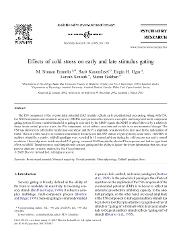| dc.contributor.author | Ermutlu, Numan | |
| dc.contributor.author | Karamürsel, Sacit | |
| dc.contributor.author | Uğur, Engin H. | |
| dc.contributor.author | Şentürk, Lerzan | |
| dc.contributor.author | Gökhan, Nuran | |
| dc.date.accessioned | 2019-06-27T08:00:51Z | |
| dc.date.available | 2019-06-27T08:00:51Z | |
| dc.date.issued | 2005 | |
| dc.identifier.issn | 0165-1781 | en_US |
| dc.identifier.uri | https://hdl.handle.net/20.500.12469/119 | |
| dc.identifier.uri | https://doi.org/10.1016/j.psychres.2003.03.002 | |
| dc.description.abstract | The P50 component of the event-related potential (ERP) mainly reflects early pre-attentional processing. Along with P50 the N100 component and mismatch negativity (MMN) were postulated to represent a complex multistage and multi-component gating system. If some variable threshold or gating is exceeded by the MMN signal the MMN is often followed by a relatively sharp fronto-central positive wave the P3a component which reflects an attentional switch to an environmental change. The P50 was shown to be affected by mental and cold stress and the P3a amplitude was shown to be increased by the anticipation of threat. The aim of this study is to examine concurrently the early and late ERP indices of gating during acute stress. The ERPs to auditory stimuli in a passive oddball paradigm were recorded in 15 normal subjects during the cold pressor test and a control condition. The cold pressor test diminished P50 gating increased N 100 amplitude elicited P3a responses and had no significant effect on MMN. Transient stress could impair early sensory gating and the ability to ignore irrelevant information that can cause passive attention switches indexed by the P3a component. (c) 2005 Elsevier Ireland Ltd. All rights reserved. | en_US] |
| dc.language.iso | eng | en_US |
| dc.publisher | Elsevier Ireland Ltd. | en_US |
| dc.rights | info:eu-repo/semantics/openAccess | en_US |
| dc.subject | Event-related potential | en_US |
| dc.subject | Mismatch negativity | en_US |
| dc.subject | Evoked potentials | en_US |
| dc.subject | Electrophysiology | en_US |
| dc.subject | Oddball paradigm | en_US |
| dc.subject | Stress | en_US |
| dc.title | Effects of cold stress on early and late stimulus gating | en_US |
| dc.type | article | en_US |
| dc.identifier.startpage | 201 | en_US |
| dc.identifier.endpage | 209 | |
| dc.relation.journal | Psychiatry Research | en_US |
| dc.identifier.volume | 136 | en_US |
| dc.identifier.wos | WOS:000232291700013 | en_US |
| dc.identifier.doi | 10.1016/j.psychres.2003.03.002 | en_US |
| dc.identifier.scopus | 2-s2.0-28844509379 | en_US |
| dc.relation.publicationcategory | Makale - Uluslararası Hakemli Dergi - Kurum Öğretim Elemanı | en_US |
| dc.identifier.pmid | 16126279 | en_US |
















